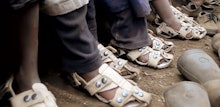A Pastor Invented a Shoe That Can Solve One of Poverty's Biggest Issues

Every year, people around the world with poor footwear or none at all are exposed to dangerous parasites, resulting in 300 million cases of severe illness from soil-transmitted parasites, according to the World Health Organization. Out of those cases, anywhere from 10,000 to 135,000 result in death, many of which could have been prevented if those people had possessed proper footwear.
Now, one man has made it his mission to address this problem with a unique invention that could save millions of lives. Designer, inventor and pastor Kenton Lee created the Shoe That Grows, an ingenious pair of expandable shoes for children that easily morph and grow in size and have a lifespan of around five years.
The idea came to Lee one day when he was walking to church while working in Nairobi, Kenya with HIV/AIDS orphans, and saw a young girl in her Sunday dress, but with shoes that were way too small for her.
"I'll never forget it. One day I was walking down a road with a group of kids from an orphanage where I was staying," Lee told the Daily Mail. "Next to me there was a girl in a white dress. As I looked down, her shoes were so small, and as I looked around, there were so many other kids with shoes that were too small for them."
The innovation was a collaboration between Lee and the company Proof of Concept. Together, they came up with a design for a shoe that expands in the front, the back and the side.
This project was overseen and launched by Because International, a charity for which Lee is also the executive director.
The shoes cost between $12 and $30, depending on the size of the order, and could be a cost-effective and simple way of saving millions of lives from easily preventable diseases, such as parasite infections.
The Shoe That Grows partners with other organizations on the ground in Ecuador, Haiti, Ghana and Kenya to get the shoes to those who need them most.
The root of the problem. Approximately 1.2 billion people around the world live in extreme poverty, off $1.25 or less per day. But if other indices are added to the calculation, such as access to education or healthcare, the number jumps to 1.6 billion, which is around 23% of the world's population.
People in poverty tend to live in environments with abysmal sanitation, which means when children walk barefoot, they are often exposed to human fecal matter on the ground.
Parasites live in the feces of infected individuals and can travel into the body via the sole of an exposed foot and cause helminth infections, which can be fatal or result in other health complications.
Helminths "can cause a range of health problems, including abdominal pain, diarrhea, blood and protein loss, rectal prolapse, and physical and cognitive growth retardation," according to the Centers for Disease Control and Prevention.
With such threatening potential outcomes of these infections, Lee's invention could protect millions of children's feet and literally save lives.
It's not that complicated. People can easily feel overwhelmed by the number of the world's problems, not knowing where to start, but the Shoe That Grows is a perfect example of isolating simple, large-scale issues and tackling them head-on.
Toms Shoes has participated in a similar initiative through their One for One program, which gives a child in need a pair of shoes for every purchase. They've given away 35 million to date.
However, some have argued that Toms' lack of durability (people have reported a lifespan of anywhere between 2 weeks and 2 years) and inefficient business model mean their initiative is not actually all that effective.
And, of course, the shoes don't grow with the kids wearing them. The feet of children between the ages of 2 and 3 years-old, for example, grow roughly two full sizes a year, so normal shoes don't last long.
The hope, then, is that the Shoe That Grows will offer a more sustainable solution to what is a straightforward problem.
When something as simple as the absence of shoes can take a child's life, there's no excuse not to try and fix this.